#severus snape meta
Text
James Potter really just tried to pull the “it’s just a prank bro lol” and the pranks were like sexual assault and attempted murder. The marauders were wildin.
#severus snape#pro snape#snape love#severus snape defense#are you kidding me#anti james potter#anti marauders#pro severus snape#anti atyd#severus snape meta#harry potter
614 notes
·
View notes
Note
I see many Snape Stans (I dislike Snape but I see why he turned out the way he did) saying James sexually assaulted him, especially on TikTok, when it’s not the truth at all, we don’t know if he ever actually took off his pants because and it wasn’t his fault that Snape wasn’t wearing any trousers. While he did bully him he never sexually assaulted him, and so many people are now saying this and I’m just flabbergasted, why did no one read the books? Why does everyone get their informations off TikTok and Twitter?
I don't really like this topic, to be honest. But here's how I perceive it.
1. In the canon, as far as I remember, it wasn't even implied that wizards wore trousers under their robes. They all just wore their underwear. And Lupin says:
"Oh, that one had a great vogue during my time at Hogwarts," said Lupin reminiscently. "There were a few months in my fifth year when you couldn’t move for being hoisted into the air by your ankle."
"Yes," he said, "but he wasn't the only one. As I say, it was very popular. . . . You know how these spells come and go. . . ."
So Snape not only created this spell himself, but it also became popular at school. So many students were hanging upside down, showing off their underwear.
From this, we can infer that wizards perceived it slightly differently than we do now, and even than Harry. It was "fun" bullying, but nothing more. Even Lupin himself sounds like he's justifying it, although he probably got hung upside down too ("There were a few months in my fifth year when you couldn’t move for being hoisted into the air by your ankle.").
2. We don't know for sure if James ended up taking Snape's pants off. Logically speaking, JKR simply didn't describe it, assuming that he did. Given the time the book was written, she probably didn't intend to invest it with such a horrible meaning. This all happens in the 70s in the WW. For our time, of course, it's SA. And that's awful. But the perception of that time could leave its mark. For example, when I was in school, many things that are now considered "awful" were seen as "not so bad". Those who did those awful things back then didn't even really understand how awful their actions truly were. Society evolves and we increasingly respect people's personal psychological and physical boundaries. What we didn't perceive as SA back then is considered SA today. A simple example you've probably seen in movies, spanking children was considered normal and right. That's how society raised those people. Surely today those same people wouldn't spank their children, because they would understand it's bad.
So it's likely that nobody at school perceived this action as SA. Moreover, James always played to the crowd. And if he really, according to the author's intention, took Snape's pants off, and the whole school saw it as normal, and didn't start looking at James with disgust... it raises big questions for the school students, doesn't it? If my friend did this today, he wouldn't be my friend anymore. Most people would look at such a person with disgust. But James's popularity didn't diminish at all.
This brings us back to the fact that nobody back then saw it as worse than bullying. So the society of that time hadn't yet formed enough understanding of what SA was and how bad it was to expose someone else's genitals. So James didn't fully understand either how awful it was, much more awful than pink bubbles out of your mouth or doubling someone's head in size. So for them it was all on the same level — taking someone's pants off or making them hang upside down or doubling their head in size.
I'm not justifying it, but the wizarding world is pretty harsh. Neville was thrown out of a window, Harry almost killed Draco, Fred and George literally made a kid disappear for a week, and Hermione kept Rita Skeeter captive in a jar for over a month. All of this is awful, but the wizarding world operates by different moral standards.
If judged in terms of our morality, there are almost no morally pure characters in these books.
I especially don't understand Snape stans (I mean I like Snape, but I don’t understand their logic). In terms of our morality, both Snape and James deserve to be punished. Snape would have got a much bigger sentence for joining and helping a terrorist organisation. What are Snape stans trying to prove? That Snape was better? No, he wasn't. They're all arseholes in terms of the muggle world of 2024.
82 notes
·
View notes
Text
going insane and i need to infodump about severus snape’s patronus being a doe for a second. i personally don’t think it changed, or lily necessarily influenced it- i think it’s always been a doe, casting the charm in dumbledore’s office was meant to show that he and lily were supposed to be viscerally aligned with each other and he knows he fucked it up and that’s why he’s spent almost two decades trying to atone for what he did. on a representative level, the doe symbolizes peace, protection, and innocence, and no three words could possibly represent severus snape more.
all he wants is peace: a peaceful life for himself, a peaceful world, a peaceful school. everything he’s ever done has been to create as much peace as possible. some of it can be considered misguided from a black and white moral standpoint, but it’s what created peace for himself. for example, aligning himself with the purist views of his housemates made him less of a target for bullying- he’s not a pure blood, and they’d know, and having powerful ambitious students on your side instead of alienating yourself from everyone means you have at least a semblance of protection from harm some of the time. he becomes a double agent for dumbledore to help bring about peace from voldemort’s reign. it might not have been peaceful for him per se, but it was still with the intention of peace in some form. he tries to give other people peace- he takes a vow with narcissa to protect her son because she’s crying and scared for him, and it gives her peace. he doesn’t throw draco under the bus to save his skin when voldemort accuses him of being the elder wands owner, giving draco and narcissa peace even if they weren’t aware. it’s either for himself, or for others.
he’s the most protective teacher at the school- would mcgonagall have thrown herself in front of three kids facing a wolfsbane-less werewolf? would flitwick take the burden of an unbreakable vow to protect draco malfoy from voldemort? would any of the DADA teachers have run towards the sound of a screaming woman? he consistently vows to protect everyone and everything he can. and, leading into his innocence, when he realizes he’s only been protecting harry for him to die, it breaks him.
he’s not necessarily innocent in that his hands are clean and he’s never done anything wrong in his life, but he’s innocent in that he’s naive. he trusted voldemort enough to be drawn into the death eaters, he trusted dumbledore enough to be manipulated into his bidding. it feels like he forgets that dumbledore screws him over constantly, dangles things in front of him and takes them away, makes crude assumptions, and has left him to fend for himself essentially their entire relationship. the times that dumbledore abandons him- physically, mentally, metaphorically- he gets very upset. like it’s new information to him that dumbledore treats him like shit. from an abuse perspective, he probably had to spend his childhood mentally erasing what his parents and home were like so he could feel safe and normal, so the constant ebb and flow/back and forth of his and dumbledore’s relationship is familiar to him. when dumbledore draws him back in with whatever method, he’s right back to behaving as dumbledore wants, doing what dumbledore wants, and believing what dumbledore believes. the times that he remembers that dumbledore doesn’t care that he let the guy who’s tried to kill him or assault go, or that dumbledore thinks he wants only lily saved because he desires her romantically or sexually, or that dumbledore has only been using harry and, by extension, him (as he’s been the one protecting harry) to play the long game of destroying voldemort are the times that he’s emotional in the books. he cries, he’s vulnerable, he raises his voice, he begs and he pleads and he defers. he doesn’t do that any other time, other than when he found harry watching his memories. he trusts and he forgives (or he forgets, or he feels safer pretending he doesn’t care what’s been done to him/how he’s been treated.) a doe is perfect for him. reducing it to something like tonk’s patronus being changed as soon as she’s in a relationship with lupin or that it’s only a doe because of lily evans completely erases his entire way of thinking and behaving and being.
also, in a self indulgent addendum, it’s a very feminine animal, and severus is consistently aligned with femininity. hermione calls the half-blood prince’s writing feminine. he wears his mother’s clothes as a child, and lupin encourages neville to dress his boggart as his grandmother. he’s quiet and docile and tries to be non-violent unless he’s pushed to his breaking point, and even then it’s screaming or crying or getting animated. he’s emotional and frequently painted as hysterical. he gets the “woman character treatment”: to the average viewer who doesn’t think about him long enough to understand otherwise, he only desires lily. the consensus is that he chases her, he only thinks about her in the context of attraction. the line about looking at her greedily is constantly understood to be lust, and not a desire for love or a desire for a peaceful relationship for once in his life (and a relationship that only ever seems to be platonic at that). he even backs off and all but disappears from her life when he’s asked to, while james (the one with the stag patronus, the classic triumphant male character) harasses her and pursues her and behaves in a way that makes his son decades later wonder if he forced lily into a relationship. he’s behaviorally aligned with what femininity in the eyes of misogyny is supposed to be. he keeps to himself, he’s quiet, he sacrifices every bit of himself for students and coworkers and superiors and expects nothing in return, he pushes his students to be the best they can. (i’d say nurtures with my whole chest, but as the narrative comes from harry, we can’t really be sure. in my view, his house won the house cup for several years in a row which was only interrupted by dumbledore awarding a fuck ton of points to his gryffindor prize pony, his classes are seen as high performing and advanced by even dolores umbridge of all people, he only tries to punish students albeit a bit violently after several attempts of getting them to understand why what they did was wrong, which seems to be pretty nurturing in comparison to what other teachers allow and do). whether he’s trans, or had been influenced more by eileen, or he was intended to be deeply complex and contradictory and that meant that he had to have these traits, or any other of the multitude of reasons for snape being an inherently feminine character, it’s there. his patronus wouldn’t be a stag, he wouldn’t be anything overbearing and he wouldn’t be anything aggressive. it doesn’t make sense with his soul and his personality and his life. the peaceful protective innocent/naive doe, however, does.
#severus snape#snape#pro snape#patronus#snape meta#severus snape meta#i’m going insane#i wrote this at work. i couldn’t sit with all of this in my head anymore#he’s the character ever#he deserves the coziest quietest little life ever. i hope he gets it in his next one#he’s so tragic and misunderstood and villainized. i might be crying a little#i could literally talk about him and all of this for hours i just figured i should stop where i was#she’s giving novel
87 notes
·
View notes
Text
I believe Snape is autistic
(FYI: I’m autistic myself and I have autistic children.)
He’s lonely. He doesn’t really have friends. We know of Lily, we also hear about Lucius Malfoy, but we don’t really see their friendship which in my opinion is much less close than fans believe. As a student he’s so alone that no one but Lily tries to stop the bullying.
He doesn’t participate in any social meetings. He’s quite miserable during the Christmas in Harry’s third year. He patrols the corridors and the grounds instead of attending the Yule Ball. He doesn’t stay for dinner after the Order meetings. He only attends the DE meetings because he has to.
His peers at school think he’s weird. Lily’s friends from Gryffindor don’t understand why she’s friends with him. When Harry asks why the Marauders bullied him, Sirius says he was different, weird, he was an "oddball". Autistic children and teenagers are often bullied because they are perceived as not normal, awkward, weird.
He doesn’t make a normal eye contact, he stares a bit too much. It can be partly explained by Legillimency, but he stared too much even as a teenager.
There’s a difference between how he speaks as a teenager and as an adult. It doesn’t sound entirely natural, he definitely had to put effort into that. It’s partly because he doesn’t want to sound like a poor man with a northern (?) accent, but autistic struggle with fluent communication may also be a reason.
He insists on precise definitions: Legilimency is not mind-reading, ghosts are not transparent but they are imprints of departed souls. He’s irritated that Harry has "no subtlety" and he doesn’t "understand fine distinctions".
He’s quite rude. He might be just *evil*, but he may just not fully understand how cruel he actually sounds. From his point of view he’s just honest and doesn’t beat around the bush. OK, maybe he’s a little mean, but not cruel… right?
He uses sarcasm (a lot of autistics actually do), but he doesn’t really appreciate Harry’s and other people’s sass, he treats their words too seriously.
He usually speaks coldly / calmly / without much emotion.
He’s usually dispassionate, he has limited facial expressions. Many autistic people also have a "resting b!tch face" unless they try to look more "normal". Perhaps he isn’t always as hateful as Harry thinks, perhaps it’s just his face.
He seems a little oblivious to other people’s emotional state and seems to analyse their behavior more intellectually.
He has special interests: Dark Arts / DADA and Potions.
He has his own collection of Potions ingredients, including rare ones, collection of weird jars (I guess they may contain some Potions ingredients, but also he may like them because of visual stimming aspect) and vast collection of books at home.
His Potions ingredients must be very orderly, he knows immediately that something is missing and what it is.
He "loves" rules. Students are breaking the rules? He takes points or gives detention. The Marauders are bullying him? He wants them expelled. (While Harry deals with the bullies on his own.) He’s caught Sirius whom he believes to be responsible for Lily’s death? He’s going to hand him over to the Ministry and the Dementors. (While Sirius and Remus want to murder Peter themselves.)
Since Snape likes rules and order, Harry who is a bit wild and unpredictable annoys him.
He doesn’t wash his hair as often as he should. It could be partly because of his poor background (he was neglected, he wasn’t taught to take a proper care of his hair, he didn’t even have a real bathroom as a child), partly because he has no one to look nice for, partly because of the Potions fumes. Autism might make him care less about his appearance. (He does care about hygiene though. Apparently he shaves regularly and Harry would certainly notice if Snape was dirty or smelly. His sallow skin and teeth have nothing to do with hygiene, it’s a result of his poverty and malnutrition.)
He stimms: He’s shredding leaves as a child. He’s flexing his fingers after the Shrieking Shack incident. During the Occlumency lessons he’s touching his lips with his finger while he’s thinking.
He has some sensory issues. He wears the same, a little baggy robes (they flutter as he walks). He’s sensitive to light: his Potions classroom is dim (it’s in the dungeons, but he could brighten it up with magic); he makes his DADA classroom dim, even though it’s no longer in the dungeons; when Harry comes to his first Occlumency lesson, Snape waits for him in a dark room. (You know, people don’t do things like that because they’re evil, it doesn’t make sense).
As a teenager he walks "like a spider" and generally he isn’t good at sports (we see him on a broom three times: in a memory of his unsuccessful flying lesson at school, being very pale and probably frightened after refereeing the Quidditch match in PS and trying to curse a DE and missing during the Battle of Seven Harrys).
John Nettleship whom Snape was partly based on was probably autistic.
726 notes
·
View notes
Text
Another controversial and unpopular headcanon about Severus and Lily.
I always read that they don't understand each other, that Lily at least is not a real friend for him, ect ect... I don't like this.
I think they knew each other. In a way impossible to replicate. They are fond of each other. Too fond. As in they want more.
I mean not necessary in a romantic way, but in a jealous way for sure.
Do you think Lily was so stupid to not understand what's going on in Slytherin? To not see how James' bully and the fact Sev is alone in the entire school affect him so much? Oh no. Oh no, she knew. And she thinks: "But I am here. Why am I not enough?"
Do you think Severus was so stupid to not understand she is doomed to be hunted in the upcoming war? That she has to have other friends, a little protection everywhere she can find it, in order to survive outside school? He knews. And he thinks: "But I am here. Why am I not enough?"
The real problem between these two was that they don't fucking talk to each other. They are teens and afraid about their feelings. I suppose Severus was in love (or thinks he was if you don't see it) and doesn't feel like she can choose him, so he deny, even in his mind. He is sooo afraid to lose her that he simply shout down inside. And I suppose Lily knew somehow, somewhere in her, that her feelings are not healty. That she is not suppose to want him so much (again not necessary in a romantic way), to care about him so much... To need that he has to want her and only her so badly. She try find a balance, she try to make other friend, but no one stick or, in fact, she doesn't really care about other people so she is afraid. She thinks something is wrong with her.
They both are so jealous about each other that this blind them. They both feel so much about each other that they are afraid. And so, they didn't talk about this, and start to think this was a "me" problem and the other sure can not feels this way.
So they are doomed.
But yeah, at the end, Lily was the person who know Severus the best and Severus same about her.
They are real friends. Even too much.
#severus snape#lily evans#severus snape meta#lily evans meta#severus and lily friendship#snily#?#I mean this can be snily too#snapedom
83 notes
·
View notes
Text
The Iceberg of Snape and Dumbledore's Scheming
If you prefer to read this on reddit, here's a link to the post.
This theory initally came from this simple observation: it makes no sense for Snape to be the referee of Harry's second Quidditch match.
In total, the text gives us directly 3 reasons, all from different point of views. For the teachers and the students, Snape is a petty bastard who wants to prevent Gryffindor from winning. For Harry, Snape is a murderous bastard who wants to kill him. For Quirrell, Snape is an interfering bastard who wants to protect Harry. This last reason is the one that we are given at the end, and that we accept as truth. It seems logical to us both in the plot of PS as Snape being a red herring, and the plot of the whole series, with Snape having always been there behind the scene to protect Harry in honor of Lily's memory.
From Snape's point of view however, this makes no sense.
"Why do you think he wanted to referee your next match? He was trying to make sure I didn’t do it again. Funny, really ... he needn’t have bothered. I couldn’t do anything with Dumbledore watching. All the other teachers thought Snape was trying to stop Gryffindor winning, he did make himself unpopular ... and what a waste of time, when after all that, I’m going to kill you tonight." - Quirrell
First, why would Snape be in a better position to help Harry while in the literal middle of a Quidditch match? He'd have to pay attention to everything happening, not just Harry, even if just to avoid being injured or killed himself, which nearly happened twice in the span of about 5 minutes. He wouldn't be able to focus nearly as much on counter spells, let alone keep an eye on Quirrell.
Second, Dumbledore's presence at the game. Even if Quirrell/Voldemort had made another attempt with Dumbledore there, I don't see how Snape could have done much from up there than Dumbledore wouldn't be able to do with spells.
So, my theory is, what if Snape wasn't there to protect Harry, but as another red herring, this time for Quirrell?
It gets a bit complicated here, as we have to keep track of the timeline and what everyone knows or doesn't know, so please bear with me.
I won't go into all the detailed explanations of Dumbledore's plot with the Philosopher's Stone, and the protections, many others have done it way better than I could, but the basic idea is this: Dumbledore knows Quirrell is working with or for Voldemort in some capacity, he orchestrated pretty much everything that happened in the first book, and asked Snape to keep an eye on Quirrell for him.
Quirrell however, doesn't know what exactly it is that Dumbledore knows. Quirrell knows that Snape suspects him, that he knows he's after the Stone, and that Quirrell made one attempt on Harry's life. What Quirrell does not know however, if whether or not Snape told all of this to Dumbledore.
Nothing, to Quirrell, indicates that Dumbledore knows about everything, or at least knows who is behind the events. After all, if he knew, why not have Quirrell fired/imprisoned, why not confront him, like Snape does?
To show this further, Dumbledore even asks Quirrell to help set up one of the protections for the Stone. This alone shows that Dumbledore must trust Quirrell, and so that Snape and Dumbledore are not working closely together, or else Snape would have told him. Snape being a referee even with Dumbledore present reinforces that idea.
In fact, to go even deeper, Snape is the one who looks the most guilty out of everyone involved.
"Yes, Severus does seem the type, doesn’t he? So useful to have him swooping around like an overgrown bat. Next to him, who would suspect p-p-poor st- stuttering P-Professor Quirrell?" - Quirrell
What if Quirrell's plan was to also use Snape as a scapegoat, the one Dumbledore would be focused on. After all, we we saw it in the book, no one looks more guilty than Snape. This would explain why Dumbledore would attend a Quidditch match, which isn't something he usually does, to... keep an eye on Snape, who would be in close proximity to Harry during a highly dangerous sports game.
From Dumbledore and Snape's point of view, this is what they are counting on. Give Quirrell a false sense of security, that the one person he fears doesn't suspect him personally, not anymore than anyone else at least, and allows the rest of Dumbledore's plans to go as smoothly as possible.
In this book, Snape is a red herring for Harry, for Quirrell, for Dumbledore, and of course, the reader.
#Severus Snape#Harry Potter#Severus Snape Meta#Harry Potter Meta#Albus Dumbledore#Dumbledore#Pro Snape#Pro Dumbledore#Quirrell#Snape fandom#Snapedom#My Own Spells
23 notes
·
View notes
Text
On Severus Snape becoming a Death Eater, free will and redemption.
How do I start this? It’s not going to be too long or too meta”y”, just random thoughts once more.
I was thinking about all the great meta posts explaining why Severus Snape became a Death Eater and why it was almost an inevitability. I probably already reblogged a few of them and will keep on doing so in the future. And I agree that he was primed to join them. It’s a damn tragedy. However, I want to add that despite knowing the odds were against him, it’s important to recognize he still had free will and that means admitting that he made a choice to join and stayed for a time (not too long) with a terrorist organisation that, while it may not have started as all that bad in the beginning, turned muderous even back in the first WW. He didn’t have to joing the Order, considering the way some of its members treated him. But, at worst, he could have flee and not get involve in the war. At best, he could have fight without joining the Order (not so sure about that last one). What I mean is that the binary choice was between joining or not the DE, not joining them or joining the Order.
I don’t think Snape participated in anything truly awfull (like torture or murder) while he was a true DE (again, I reblogg or will reblog great posts about that), but he knew they were doing orrible things to human beings and, even if we go with the more charitable headcanon that he didn’t ever truly share their beliefs (not wholeheartely at least) or that he had begun to question them and that Lily was just the last straw pushing him towards the “good” side, he still gave his implicit agreement by being a member. And yes, leaving, especially before having Dumbledore’s help would have been terrifying for all kind of reasons. His decision to do so is still incredibly brave.
I’m not saying all the above to shit on Snape, my absolute favorite HP character and one of my all time favorite fictional character point blank. I think that even if he took a wrong turn at first he’s still very sympathetic and, again, so much was stacked against him that it’s easy for me to forgive him. It’s because I respect him that I want to recognize that he was more than a mere puppet, that he had still his free-will despite all of the attenuating circumstances, that he first choose to do the wrong thing, paid the price, realised before or after having paid said price that he was in the wrong, did everything in his power to rectify this, lived and died as a hero.
To me it ony enhanced the great man he became.
There’s no redemption arc otherwise.
#DE!Snape meta#DE!Snape#Severus Snape meta#Severus Snape#Harry Potter meta#Harry Potter#Despite the appareance#I still consider this a pro Snape post#It's made with love for the character#as a character and as a person#not a real persone#obviously
71 notes
·
View notes
Text
Snapedom!
Anyone having meta or ideas on why Severus had specifically been killed by a snake? Why would Voldemort, despite admitting that Severus had been a loyal servant to him and showing no signs of suspicion in his loyalty, decide to kill him in such a cruel way? And why Nagini, of all snakes?
Thanks in advance for input!
#i would have thought to emphasize that severus was a potions master#on the other hand#he might have had an antidote precisely for this reason#and voldy believed he had to be killed without another option#so why#and why all the gore#in a teenage book.#but this is a question to rowling#anyway#meta pls!#snape meta#severus snape meta#hp question#harry potter#severus snape#voldemort
58 notes
·
View notes
Note
7. List three honest flaws your favorite character has and talk about how those flaws make them problematic.
@dream-dove
//You asking the hard question today likes. Let me think. Okay. So. Favourite character over here or in general? Cause like my favourite character is probably always gonna be Severus Snape. He's my boo.
So, for Sev, he has the following flaws;
1: His temper. He can get angry and viciously so fairly easily and he really lets that take the reigns sometimes and that only ever generally leads to problems. Case and point, the break of his friendship with Lily was because he lost his temper and he wanted to lash out and he chose her because she tried to help and this wounded his pride which just made him even angrier. He wasn't stupid. He knew exactly what to say to push her away. The only problem was, it pushed her away permanently.
2: He can't let things go. Look at how he treats Harry because of what James did to him. Look at how he winds Sirius up yet again, because of what he did to him. It's not just others though. He won't give himself a break either, not when it comes to things he has done wrong, like what happened with Lily. He can try blame the Marauders, and does, but deep down he knows that was his error. This is a man who is haunted by his mistakes, haunted by his past, and both Voldemort and Dumbledore use that to get Severus to do what they wish him to, regardless of what he thinks/desires, regardless of the state of his own soul.
3: His fear. He doesn't fear all that much but what he does fear causes issues for him. He fears becoming like his father so much that he ends up being like his father in some regards. He fears becoming the worst version of himself and I would argue, at times, that comes to pass absolutely. This is much more of a fanon based point as it isn't specifically confirmed in the canon material that his father was abusive etc, we just get told neglectful family, but fanon has widely accepted his father as being abusive to him and his mother.
He also fears losing Lily and this fear motivates him to effectively bind himself in service to yet another Master, a Master who demonstrates more than once that he does not care so long as Severus does what he's told. See previous statement about the state of his soul and killing Dumbledore specifically. He asked too much but didn't care and used flat out, bald faced manipulation to get Severus to agree.
3 notes
·
View notes
Text
These are just my personal headcannons about Severus’s Clothing:
1. It is his armor against the rest of the world, a physical way to represent the shutting out of others, a kind of bodily Occlumency that makes him feel safe.
2. It is impossible as an adult to do to him what the Marauders did to him as a child, I.E strip off any part of his clothing. There are so many layers and buttons I image it makes him feel physically and sexually safe as well. No eyes where he doesn’t want them. No hands where he doesn’t want them. No Wands to remove what he doesn’t want removed. (Could he possibly enchant his clothing too; to make it impossible for someone besides himself to undress him?)
3. On a lighter note, it’s Victorian chic as hell. It’s Screaming Byronic Hero from a million miles away. Like something out of a Mary Shelly or Dracula novel, just so romantic and sweeping and refined looking. Goth King we stan.
#severus snape#pro snape#snape love#harry potter#severus snape defense#severus snape meta#anti james potter#anti marauders#pro severus snape#harry potter books#clothing
286 notes
·
View notes
Text
Magnum Opus or Great Work: Alchemical Codes in "Harry Potter"
"I've never wanted to be a witch, but an alchemist, now that's a different matter. To invent this wizard world, I've learned a ridiculous amount about alchemy." JKR. By the way, it seems JKR never became an alchemist because you can't be that evil an alchemist, Joanne. Something went wrong.
The first part about Lily and James
Voldemort – an occult alchemist, Lucifer. Snape – a Seeker who chose the wrong Path. Dumbledore – Keeper of the Tower. Hermione – Hermes Trismegistus. Harry, Hermione and Ron – the three principles for creating the Philosopher's Stone.
Alchemy is the universal path of spiritual transformation. In a literal sense, universal, this code is practically everywhere–from ancient myths and the Bible to the philosophy of Nietzsche (though in his understanding) and Jung's books. Harry Potter himself is a complete alchemist's path, but there's also a well-displayed second path–the path of the occult alchemist.
True alchemy tells us that God is in everything, like a seed present in every person. Through alchemical transformation, a person can be reborn – and become golden, divine, immortal.
Many famous people were fascinated by these ideas – from Newton to Goethe, from Walter to Mozart. Yes, Walter and Mozart were freemasons, but freemasonry is built on the Magnum Opus, it's its foundation. Who has seen the opera The Magic Flute? A completely masonic opera: the surface layer was for the people, and the deeper layer – for the spiritual elite of that time. In this opera, the power of love transforms people and makes them divine. Oh, it seems to resemble Harry Potter, hehe... Harry Potter also has two layers – one as a fairytale about a wizard for teenagers, the other – for those who can "feel" the symbols, even without knowing them.
Each symbol can be interpreted in several ways, that's the complexity of alchemical symbolism. For example, Albus Dumbledore. He symbolizes (in JKR's own words) Spirit ( he's white), and Rubeus Hagrid – Soul (red) – and they're both like two fatherly figures for Harry, distant and warm, judicious and understanding. But all this is at the character level. Dumbledore has other meanings – much more important ones. As I've said before, the symbolic level and the character level are different levels. In interpreting symbols, you don't need to interpret every line, you need to take the context as a whole. Characters operate on one level, symbols – on another.
So, alchemy is an extension of the universal idea – to be reborn, you need to "die." Like Jesus died on the cross, Orpheus on the banks of the River Gebre, and Osiris in the coffin prepared by Typhon, in alchemy, until all the elements (parts of the old personality) die, the work cannot be completed.
The stages of this alchemical process can be traced in the lives of almost all world "heroes" and in the mythology and legends of many cultures. This is a universal code.
“Very truly I tell you, no one can see the kingdom of God unless they are born again” John 3:3
Alchemy proclaims that without decomposition, the Great Work cannot be accomplished.
The past Self dies on the cross and in the retorts and becomes black during decomposition. The new Self rises from hell, like a phoenix. The phoenix is a pure alchemical symbol.
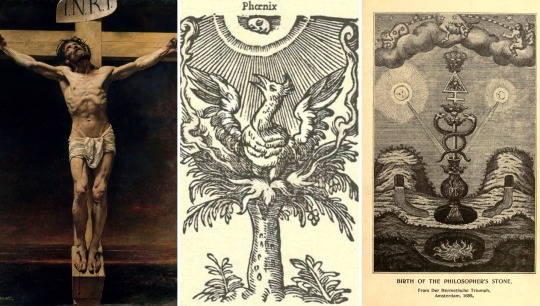
This is the creation of the Philosopher's Stone.
It is symbolically described in "The Chymical Wedding of Christian Rosenkreutz". The book presents an allegorical story divided into "Seven Days" or "Seven Journeys," which tells how its author, Christian Rosenkreutz, was invited to a castle full of wonders to help with the "Chymical Wedding" of the king and queen. Harry also receives a letter in a storm (like Rosenkreutz) and goes to the castle for 7 years, chooses one of the four paths (Gryffindor), and so on.
Alchemists called the creation of the Philosopher's Stone the Great Work – Opus Magnum. This process consisted of three stages: decomposition (nigredo), rebirth (albedo), and final perfection (rubedo). Each of these stages corresponded to a specific colour: black, white and red.
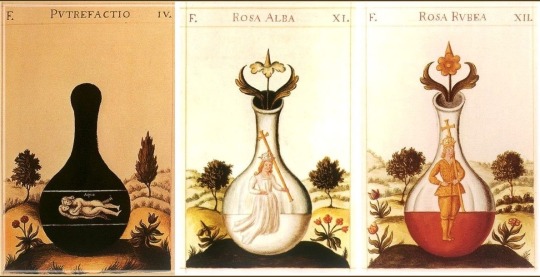
Nigredo. Albedo. Rubedo.
In Harry Potter, these stages correspond to Sirius Black, Albus (white) Dumbledore, and Rubeus (red) Hagrid. The end of each stage is marked by their death. In the seventh book, it's Hagrid who carries the "dead" Harry.
There is a fundamental difference between "true alchemists" and "occult alchemist."
Tom Riddle is an occult alchemist. For him, the Great Work is also self-creation, but what kind? For him, it is complete mastery of his abilities and his future, and especially the complete liberation of his will.
Tom is a will, but his will not submissive to the will of God. It's a Luciferian will. The will of a fallen angel who began to oppose his own free will to the influence of Divine Love-Light. Instead, he sought and loved his own power outside Divinity, in himself.
"Better to reign in Hell, than serve in Heaven" John Milton, "Paradise Lost"
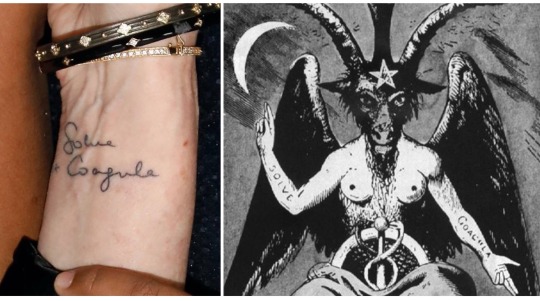
Baphomet, or the Sabbatic Goat, drawing by Eliphas Levi, on its hands are inscriptions "Solve et Coagula." This is an alchemical principle. JKR, by the way, also has such a tattoo.
In occultism, it is believed that magic is control of one's will, and a will can control matter. After all, what did his followers choose for their motto? Magic is Might. Harry never defeated Voldemort with such magic. Because he doesn't need it.
What does Tom boast about? Tom boasts that he has mastered the deepest depths of dark magic. He went so far in it as no one before. Dark magic requires an iron will, and Tom achieved incredible heights in it. He even achieved immortality in this material universe, literally cursing his soul! Only Tom doesn't understand that Dumbledore (a true alchemist) is not interested in all this. Because true immortality is not there. True transformation is not there. Because their paths are completely different – Dumbledore is going to the "God and divine immortality," and Tom is going to "material immortality."
In general, fans of occult alchemy, the Left-Hand Path, and Nietzschean philosophy probably consider Tom a much more interesting character because here he is – the king of matter, a man of incredible will and strength who destroys the slave Christian morality and proclaims that God is dead, long live the Übermensch (homo superior)! (Nietzsche would have been proud of him…) By the way, Bellatrix is most likely symbolically – Lilith, Adam's first wife according to Kabbalistic apocrypha, who rebelled against Adam. God created them equal, and Adam wanted to have power over Lilith... In short, Lilith is the first feminist in human history, hehe.
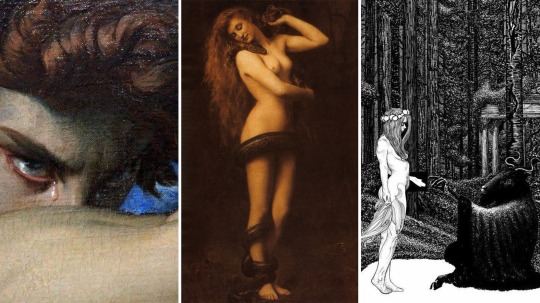
The Fallen Angel by Alexandre Cabanel. Lilith.
In short, Tom Riddle is such an adept of broken alchemy. Where Tom is his own personal will, Harry is Faith and the will of the Spirit. Harry is also very strong-willed, but his will is different, it's not individualistic. It's a will of sacrifice, a will of love, a will of mercy, a will of trust. The main theme of the seventh book is a crisis of faith. And what kind of will does one need to show to continue the quest for Horcruxes and not go for the Deathly Hallows? Simply put, the will of Harry and Tom is completely different.
And Tom will never understand this. He's an individualist. He's a Nietzschean Übermensch. He's reached the limits of human capabilities. But for what? From dust you are and to dust you shall return, Tom...
Severus Snape — a Seaker who chose the wrong Path
And Snape, by the way, initially turns away from Lily (Lily is love of God, represented in the world). Because he's obsessed with becoming dark magic, his ego and desire for secret knowledge and being proud are very great.
Btw, Lily is a mudblood. In the sense that God is not in shining beautiful armor. This is Lucifer's mask – to be pure, to shine, to sparkle. But the real God can be found by seeking, under the feet of the poorest and "dirtiest" person. After all, for God, everyone is equal. It's the Devil who divides.
And pure-bloods, for example, the Blacks, are "false purity." Luciferian purity. Material purity, purity of shining gold. It's division. And where there's division – there's the Devil.
In short, Snape turns away from Lily because this path is difficult, he doesn't understand how to approach her, he already uses dark magic, has a lot of knowledge, and delves into various secrets, and shows what "bad" paths other seekers (the Marauders) take... (The seeker is not my term, it's from the Rosicrucian manifesto, alchemists call themselves seekers) But Lily still refuses to unite Spirit and Soul. And he calls her a "mudblood," insulting her. For Lily, this is a sign that this soul is almost lost. And there's no sincere regret in him when he asks for forgiveness. He asks her to forgive him, but his soul is still on the old Path. Lily isn't angry with him, it's not about anger or offense. Snape's soul is almost lost at this moment, closed to the divine spark and love. After all, for love to enter your heart, you first need to open yourself to it.
Only when Snape sees true face of Tom's "alchemy," in which Tom is ready to kill Love, the divine spark, essentially kill God in the souls of all people, then Snape, as a real Seeker, realizes that he's going the wrong way... And he runs to the main Alchemist, Dumbledore, to ask to preserve this love, this manifestation of God on earth.
But you can't preserve it without preserving the seeker of the right Path in your soul (James) and without preserving the possibility of the emergence of the transformed soul (Harry).
This is a very important moment, not only because you can't kill people in principle. Dumbledore literally tells him that you can't save love of God, the divine spark in your soul, if you kill in yourself the one who reaches out to God (the deer) and if you kill the POSSIBILITY of becoming this new transformed soul (Harry).
For Snape, this becomes a turning point, and he decides to switch sides to true alchemy. Dumbledore asks in return for Snape's soul, but not in the sense that the Devil demands it, he asks for loyalty to the Path. Below I'll explain the symbolism of Dumbledore and what he means in terms of alchemical symbolism (I don’t think he is God).
Snape becomes loyal to Dumbledore. But Lily is killed, as is James. The world, despite the fact that Voldemort temporarily goes into hibernation (and the Savior is alive), plunges into despair. Sirius (as a divine symbol of light) is in captivity, Remus (a symbol of a seeker with a "good but not brave" soul) is somewhere wandering the world, and Harry lives very poorly with the Dursleys... Harry doesn't know any God, and the seeker in him is also "dead". And Voldemort will soon rise again, he's just gathering strength.
Harry's path is the path of returning to God through Mother of God (Theotokos). Because it is Mother of God who is the true Spirit. That's why he meets Lily only at the end of the seventh book, when he's almost completed the alchemical transformation. For Christians, this is heresy, but for alchemists, it's not. The Son and Mother of God are one whole. The Virgin Mary is part of the Trinity, because only through the spiritual unity of the Mother and the Son is the salvation of humanity possible.
And who does he meet her through? Through Snape. Who dedicated his entire life to transforming his Soul, merging it with the Spirit, ultimately coming to God.
He spent his whole life hating James, as a Seeker of a different kind, not like him—Snape always leaned a bit towards Nietzschean stories. And James always hated Dark Magic and all dark things (although this doesn't make the souls of this type much better, they can also be egocentric). Snape teaches Potions, he knows how to bottle up Love, Death and Luck... So much power, so much pride in this...
Recently, I reposted a very interesting post. Snape wanted to recover his soul, because he was guilty of Lily's death. A very beautiful meta, but I see a bit different alchemical meaning. His soul is broken not only because Lily partly died because of him. His soul is broken overall because of the Path he chose - that of an occult alchemist, and he remains a "spy" to the end of his days, playing two roles, constantly "here and there". He dies at the hands of his former master.
Snape takes Lily's letter because he needs Lily's love (like people wear crosses), while there isn't enough understanding of where to go (Dumbledore is already dead)
Snape always yearned for Lily. And Dumbledore asks for us, the readers: "After all this time?" And Snape answers for us "Always." You must love God always. And that is salvation for the soul.
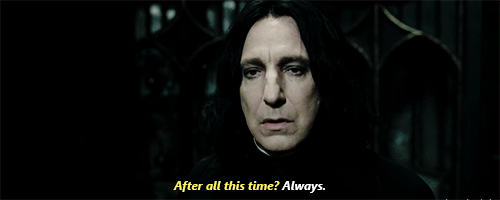
In general, Snape only understands towards the end that you cannot love Lily without Harry and even James. Only one Path leads to Lily - the same as James’s path. The path of Ego, pride, thirst for power, secret knowledge, occultism, malice, hatred must finally dissolve. Snape fully exposes himself to Harry, although he shouldn't have (he should only pass on information about death), revealing the good (and the bad) that he always hid. His revelation to him speaks of his complete acceptance. He shows him his soul, literally bowing his head to him - here I am, here is my soul, in some things I have no excuse, sometimes I have justification, but I've been seeking God, seeking love all my life.
Will you accept my wounded soul?
This is confession. The realest confession.
And Harry accepts. Of course, Harry accepts. He looks at him with Lily's eyes.
Because no matter how "bad" you are, if you truly love God in your soul, if you truly seek Him, there will always be a place for you in the City of God. Snape is the constantly replayed plot of the Prodigal Son's return.
At this moment, all the "black" in Snape dies – the nigredo. Tears - the white stage, purification – the albedo stage, purification. Blood – naturally, the red stage. The alchemical transformation for Snape is complete.
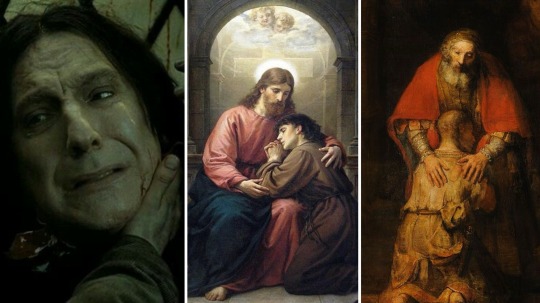
(But geniuses from TikTok will still say that Harry shouldn't have named his son Albus Severus, because Snape was baaaad. Ofc he was bad sometimes, that's the point!)
Dumbledore is the embodied Path and Plan
As I mentioned before, Dumbledore asks for Snape's soul in return, but not in the sense that the Devil demands it, he asks for loyalty to the alchemical Path.
Dumbledore, as an alchemist, besides embodying the completion of the albedo stage for Harry with his death, is also the embodied Path. Dumbledore is the highest Guardian of the Tower, who watches over the Paths of others, he is the Man of Spirit, he is the Principle, he is the Master. What is the difference between Dumbledore and Lily? Lily is a more important symbol, she is like pure divine power, God = love, as in what all souls dissolve. Dumbledore, on the other hand, is the Guardian of the Path through which everyone must pass. In short, Lily is the answer to the question "where", and Dumbledore is the "how". And Dumbledore is just a man who also underwent his alchemical transformation and who can also succumb to temptation. But Dumbledore is not GOD, imo. To personify God in a book is too much (even for me, although I’m not religious at all). I don’t like the idea of him being God and... really, where? God is transcendent and pure divine love emanates from Lily that’s why she almost an empty canvas. Dumbledore is a principle. He is the answer to the question "HOW". That's why he asks to believe in him, believe in the ALCHEMICAL PATH AND PLAN. FOLLOW THIS PLAN TO THE END. Ascend the tower, as I once ascended it. After all, he lives up there in the tower. He observes.

For Snape, Dumbledore is so important because Dumbledore is the Path, a new Path that he did not have. And Dumbledore's death is so important for everyone because now no one points them towards the Path. But they must find this Path within themselves. Because the answers are inside them. You cannot become a true Alchemist if you constantly rely on external help. It's time to see the Path independently.
"You must kill me."
There was a long silence, broken only by an odd clicking noise. Fawkes the phoenix was gnawing a bit of cuttlebone. (HP and DH)
After Dumbledore says that Snape must kill him, there is silence and a very clear symbol - the phoenix and the bone. It's time for their souls to go independently, to eat away all the old to come to rebirth. Meanwhile, they also need to save Draco, who, by "Lucifer's" order, is about to kill the Path (although you can't outplay God's plan...). And then Dumbledore reveals that Harry must die.
This shocks Snape. Like any alchemist on the Path. How so, to die? After all, we all do everything to become closer to God, to immortality, and you say – just die? What kind of Path is this?
"I thought…all these years…that we were protecting him for her. For Lily.”
After all, we were protecting Harry for Lily, because as I've already said, only through the spiritual unity of the Mother and the Son is the salvation of humanity possible. Snape is protecting the son for the mother, and Dumbledore wants to kill him? For what?
Simply put, Snape doesn't understand that no one can save Harry until he dies and is reborn. It's painful, but all heroes go through this path for rebirth.
Dumbledore knows that there is a "seed" of "evil" in Harry, as in any of us. After the fall, we all carry Luciferian part within us. This is the last thing that must die in Harry, and he himself must die for it.
No one promised that the path of the alchemist would be easy. It's understandable why not everyone loves Dumbledore, he seems too cold and manipulative, but there is no other way for Harry on the symbolic level.
The Great Work
There are three stages of the Great Work: decomposition (nigredo), purification (albedo) and ultimate perfection (rubedo). These stages for Harry culminate in the deaths of Sirius Black, Albus Dumbledore, and his own death, where he is carried out of the forest by Rubeus Hagrid.
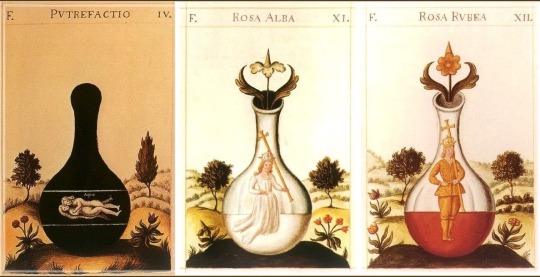
And the result of his alchemical work should be Rebis — essentially the alchemical philosopher's stone, an androgynous being. In the collection of dialogues attributed to Hermes Trismegistus, God is depicted as androgynous. (Hermes Trismegistus is essentially the one who created the corpus of Hermetic texts).
Rebis is the unity of opposites. Day and night, Man and Woman, Good and Evil, Light and Darkness. All is one. There is no division. The wholeness of God. After the fall, we are all divided. And after the alchemical transformation, we can finally become whole and find ourselves and God.
In the form of merged men and women, sometimes depicted as the Virgin Mary and Christ, because They are one whole. As I have already said, for many alchemists, the Virgin Mary is part of the Trinity because only through the spiritual unity of the Mother and the Son was the redemption of original sin made possible. As I have already said, although Harry suffers more for James (his father turned out not to be as ideal as he thought), Lily is the main symbol in "Harry Potter".

The Nigredo stage literally means "blackness" - it signifies complete breakdown, decay, descent into the underworld, the trance of grief. It's a descent into the deepest fears, disbelief, denial, loss of self, anger, aggression. And through this - a return to the prima materia. This is what happens to Harry, "The Order of the Phoenix" is a very dark and depressing book, and with Sirius's death, this stage for Harry is completed. Sirius himself also undergoes transformations, but about this in the next part. The nigredo stage, during which a person's ego dissolves, is agonizing but necessary for further development. After the "I" meets its "shadow" and disintegrates into parts, it will need to be purified and recreated.

Albedo ("whiteness") symbolizes purification, transition to another world, change of life priorities, awakening, enlightenment. In alchemy, the transition from nigredo to albedo is achieved through the process of washing. The whole sixth book is misty, "white", "wet". "Washing" (albutio, baptisma) directly leads to whiteness (albedo). Purification. It's also silver, a lunar state. In Harry Potter, there is a character named Luna, which means moon in Latin. In different parts of the books, Luna also symbolizes this stage. With Dumbledore's death this stage for Harry completed.
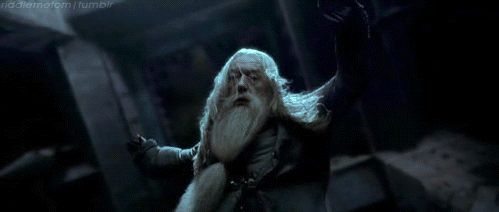
Rubedo ("redness") - the final stage of the alchemical Great Work. The alchemist must establish a kind of sacrificial relationship with his inner essence. At the final stage, the so-called "alchemical marriage" takes place: the marriage of the Red King and the White Queen - Soul and Spirit. Harry (soul) and Lily (spirit) are united. With Hagrid carrying Harry this stage for Harry completed.

Bu the way, the Golden Snitch is an alchemical symbol also.
Firstly, Harry's position is called the Seeker. Alchemists also called themselves that. Secondly, the winged disc is a very ancient symbol, meaning the sun (God) and immortality.
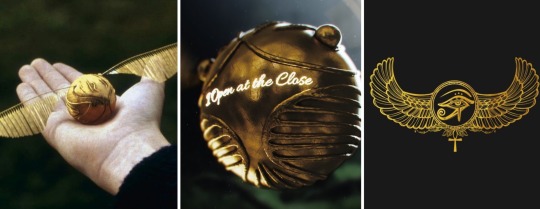
The Snitch reveals to him the Resurrection Stone, and Harry "encounters" his main symbols, but the main one is Lily. It is her he asks not to leave him.
Harry's death here is read by everyone as the well-known plot of Christ's crucifixion. The path to this death is also a reference to the agony of Jesus in the Garden of Gethsemane before the Crucifixion. After all, Harry also wanted to end up somewhere, but Hogwarts is his home, and he accepts his fate.
My Father! all things are possible for Thee: take this cup of suffering away from me: and yet not what I desire, but what Thou desirest. Mark 14:36
He wanted to be stopped, to be dragged back, to be sent back home... But he was home.

Lily's Eyes
To be honest, I can assume that her green eyes was chosen at random. But what if they weren't? Her green eyes may seem illogical, as this is the colour of the snake, the colour of Slytherin, the colour of evil. But this is the occult Luciferian snake, the erroneous snake. Originally, green also dates back to Hermes Trismegistus – the god who gave the knowledge of alchemy. The most famous of the old hermetic-alchemical texts is inscribed on the "Emerald Tablet". According to legend, this document was left by Hermes Trismegistus on a plate of emerald in an Egyptian temple.
"The Emerald Tablet" is very important for alchemists." According to legend, a large emerald fell to the earth from Lucifer's head when he was cast out of heaven. From the same emerald that fell from the crown of the fallen Lucifer, angels made the Holy Grail (which is also the philosopher's stone, and the Snitch...). Emerald is a sacred green stone, and the heavenly divine world - the homeland of the emerald - a precious stone in which information about the heavenly homeland is encoded.
There is also the Ouroboros - a snake that devours its own tail - a symbol of infinity and immortality.
And the Snitch, which is a reflection of Hermes Trismegistus' staff (which has two battling snakes - two opposites, Spirit and Soul, Good and Evil and so on, and Hermes establishes unity between them with his staff).
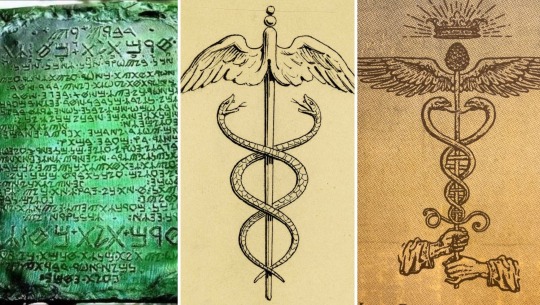
Occultists, of course, interpret these symbols in their own way.
Hermione is Hermes Trismegistus. Mercury. Ron — Sulphur. Harry— Salt.
Hermione (Ἑρμιόνη [hermi. ónɛː]) is a feminine given name derived from the Greek messenger god Hermes. As I said, Hermes Trismegistus is the main figure of Hermetic teaching, he is also the one who predicted the coming of the Savior (traditional Christianity should not be confused with Gnostic teachings, the Church has always been against Gnosticism). In addition, Hermes is Mercury, and that is knowledge. Hermes Trismegistus shares "secret knowledge" with the world, which forms the basis of many Gnostic directions - from alchemy to Kabbalah.
Hermione is a little alchemist, she shares knowledge. It is Hermione who insists on complete trust in Dumbledore, it is Hermione who often leads Harry in the right direction when Dumbledore is not around. It is through Dumbledore and Hermione that "moral lessons" are often sounded, which often seem completely out of place. Like when Dumbledore says that James would forgive Peter. At that moment, I always want to say, "Are you out of your mind?!" although I understand that it is described on a symbolic, not personal level.

Mercury (Hermione), Sulphur (Ron), and Salt (Harry) were necessary in the alchemical transformation and were the main components. To create the philosopher's stone, all three elements had to be combined, and Harry is next to them throughout all the books.
Both Hermione and Ron are equally important in Harry's development.

Mercury is the more fluid primary principle, more rational, the feminine principle, while Sulphur is dynamic, expansive, unstable, acidic, unifying, masculine, paternal, and fiery principle. Sulphur is emotional, it is desire and passionate impulse that motivates life. Sulphur is desire. And according to Jung's reflections, it can also be foul and dangerous. Complete transmutation depends on the correct application of this variable principle. Sulphur must be of quality for transmutation to occur. And Ron achieves this quality.
Also, in mystical alchemy, Sulphur is crystallized inspiration of Mercury (Mercury).
Mercury and Sulphur are simultaneously antagonists, like the male and female elements, but at the same time Sulphur is crystallized Mercury.
So I have always been and will always be for Romione! Hehe. They were made for each other!
And as for Salt - that's Harry. It's the body. Sometimes it is called earth and body, salt is the essential body (corpus).
Alchemists say that salt was the first substance created by fire, emanating from God. In salt, all creation is concentrated, in salt the beginning and the end of all things.
Salt is associated with the ultimate elevation of matter - with matter that has acquired consciousness, achieved through the unity of opposites, including the unity of fire and water, the unity of what is above and what is below. Salt is the ultimate Philosopher's Stone, representing transcendence and ultimate knowledge.
Thus, salt symbolizes consciousness (thoughts, feelings, material, etc.), which must be elevated through alchemical processes of dissolution and recrystallization. Well, that's Harry himself.
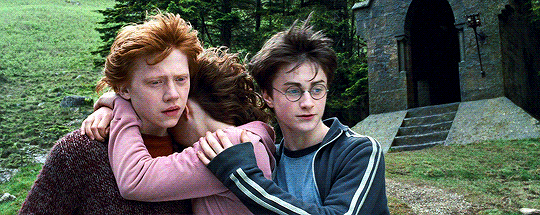
Just love this stupid moment
Well, that's it, I think I've said everything, and from the next part, we can move on to the Marauders themselves :D
#i'm wondering if anyone but me is even interested in this at all#harry potter meta#harry potter#hermione granger#ron weasley#pro ron weasley#rubeus hagrid#pro severus snape#pro albus dumbledore#pro romione#hp meta#severus snape meta#lily evans#tom riddle#voldemort#tom riddle meta#bellatrix lestrange
46 notes
·
View notes
Text
Severus does seem the type, doesn’t he?
«
“Severus?” Quirrell laughed, and it wasn’t his usual quivering treble, either, but cold and sharp. “Yes, Severus does seem the type, doesn’t he? So useful to have him swooping around like an overgrown bat. [HP&PS]
»
I think a lot of problems with how many HP fans percieve Snape stem from the type of person he seems to be.
As a teenager he’s a skinny, awkward nerd who hangs out with the wrong crowd and is fascinated by a dangerous ideology. He seems to be an archetypal nerd and incel fascinated by neonazism. A lot of ideas who Snape is, what his motivations are and so on, stem from not the source material but the archetype he seems to match.
The thing is, while he has a lot in common with this archetype, there are also significant differences. Without them Snape wouldn’t have betrayed Voldemort and become a spy, he would have stayed a loyal DE or another Karkaroff. This is important thing about Snape: he seems the type, but he is not the type.
Lily and Snape’s friendship wasn’t an awkward situation where Lily was a kind girl who sometimes talked to the local nerd out of pity and Snape jumped to the wild conclusions that they were best friends now. Lily truly liked him and they were real friends, not just in his head.
Was he jealous of James? Most likely he was, but he had a real reason to worry about Lily. James was a bully, Snape also believed James knew about “the Prank” beforehand. Would Snape have reacted in the same way if a genuinly nice boy like Cedric Diggory had been interested in her? We don’t know, but we can’t be sure that he would have reacted equally negatively. A jealous incel would have done that, but it’s not enough to be sure that Snape would have too.
After Snape called Lily a Mudblood, he sincerely apologised. An archetypal incel would have tried to put the blame on James and on external circumstances, he would have tried to gaslight Lily. An incel has a victim mentality: he’s not the one to blame, others are. But Snape did none of those things.
Snape didn’t feel entitled to Lily’s attention, he was her friend. She liked him and talked to him willingly. After Lily ended their friendship and told him to stay away, he did. He respected her wishes. An archetypal incel wouldn’t have listened, would have tried to contact her afterwards and felt entitled to her attention just because they used to talk. Snape did not, he left her alone as she wanted.
Snape was never friendzoned, because he had never asked Lily out. There is even no proof that he was in love with her romantically. Personally I think he had a crush on her, but her friendship was most important to him. I guess he didn’t want to lose it and waited for some signs that Lily had feelings for him too. Having an unrequited crush on somebody isn’t a crime, people don’t control it. An incel would have expected a romantic relationship in exchange for being nice. Snape respected Lily’s feelings and didn’t expect anything from her.
When he found out that Voldemort thought the Prophecy concerned Harry Potter, he asked Voldemort to spare Lily’s life. He could have asked him to Stupify her so he could have made her his sex slave. He could have Obliviated her so that she wouldn’t have remembered her family, he could have given her a love potion. It would have been so easy. According to Hagrid, Voldemort had wanted to recruit her before, so he surely would’ve been on board, wouldn’t he? But Snape after initial, emotional impulse to beg for her life didn’t come with such a plan. He went straight to Dumbledore, even though he could have been killed, and became a spy, risking his life, just to save Lily and her family. He took responsibility for his actions. He didn’t do it because he expected something from Lily. He hadn’t talked to her in years. It wasn’t selfish, it was selfless. He tried to save her and her family without expecting anything in return.
Do you know who saw Snape like the archetypal incel? Voldemort. And that mistake led to his downfall.
237 notes
·
View notes
Text
snape is such a fun character to make headcanons for because i feel like there’s so many ways you can go with it. like, i’ve seen a lot of people say that snape doesn’t take care of himself, like not eating well or washing his hair (lol), and i think that definitely makes sense considering his martyrdom/guilt complex and being raised in poverty. but i’ve also seen people imagining that snape is like really good at cooking and baking, which makes sense with him being a potions master but also kind of conflicts with the other point of view. i think the happy medium is that snape knows how to cook and bake but wouldn’t take the time to do them for himself, only for other people. however there’s a secret fourth option that i want to know people’s opinions on
i like the idea that snape actually does take care of himself, but he’s just kind of bad at it. like i think he tries to make his hair look decent, but it just gets greasy really fast and he tends not to notice until it’s already in pretty bad shape. and i also kind of like the idea of snape not only cooking and baking for others, but also for himself – not out of any real love or care for himself, but as a way of chasing success and distancing himself from his childhood and from poverty. like i can just picture him at the malfoys trying some fancy hors d’oeuvres and being like, oh, so this is how the other half lives. i want to get good at this. and there’s something wonderfully ironic (and let’s be real, kind of pathetic) about the idea of snape carefully preparing a charcuterie board of expensive delicacies to eat by himself in the dungeons or the drafty old sitting room in spinner’s end.
in this case, his hair and his eating habits are really symptoms of the same problem – he’s trying to run away from his past, but he just keeps failing. he tries to fit in with the upper class and the purebloods, to the point he acts like them even when he’s alone, but there’s always something that betrays him as an outsider, whether it’s his body, his loneliness, or the fact that he still lives in his childhood home. no matter what he does, no matter how hard he tries to escape himself and his memories, he just can’t succeed.
…almost like how even when he’s trying to be a good person, he still has to kill someone he cares about to be one. he’ll never be free of his past, he’ll never be firmly on one side or the other. he’s just kind of doomed.
basically the takeaway here is that any headcanon can be true if you frame it the right way. also we should read way too much into everything forever. ok byeee
#lol this is the draft i was talking about. it’s mildly insane but. whatever#hp#severus snape#snape#hp meta#snape meta#pro snape#professor snape#snape fandom#pro severus snape#snapedom#harry potter meta#harry potter#hp fandom#my posts
484 notes
·
View notes
Text
Severus getting a prep cook job in Cokeworth one summer and picking up solid mf knife skills. Like those culinary school chopping videos. Just fast asf precise knife work and handling.
He gets back to Hogwarts and it’s just business as usual until he’s DEAD tired one day and is prepping ingredients in Slughorn’s class. He gets to something that needs to be sliced uniformly and is similar in shape/size to food he prepped at the restaurant and muscle memory just kicks into overdrive.
The whole classroom freezes and looks at him because idk if y’all know this but that shit is LOUD compared to hesitant knife work. It smacks the cutting board and has a way different rhythm than normal kitchen noise.
Yeah it’s a skill no one has encountered unless they have been back of house at a restaurant.
Severus is too exhausted to process that anyone is paying attention to him so he just keeps going. Ingredients? Prepped? Potion? Brewed with gusto, like he was born to do it. His brain isn’t online so he’s acting like it’s a dream and adds in some flourish and flair, a trick to catch a knife, a fancy stir to help aerate the brew, a crazy amount of multitasking just because he can.
Jaw dropping behavior.
Slughorn doesn’t know how to react honestly, and is spared needing to praise him considering Severus is half awake when he hands his potion to his head of house.
#harry potter thoughts#harry potter imagine#hp imagine#harry potter#harry potter rant#harry potter marauders#marauders era#marauders imagine#marauders#pro severus#severus snape#severus snape imagine#pro severus snape#young severus#hogwarts school of witchcraft and wizardry#horace slughorn#professor slughorn#harry potter fandom#harry potter meta#harry potter drabble#harry potter crack
870 notes
·
View notes
Text
Recently, I've realized that one of the major disagreements I have with some of the more radical Snape haters is that they interpret Snape as being duplicitous. One big example of that mindset is their belief that he knew Peter was the spy but kept this information a secret to get revenge on his school bully. They also present him as using his position as a teacher to unfairly punish or try to punish Harry.
But, the more closely I study this character, the more I see him as someone who is, in his own way, very earnest and who cares about following the rules (maybe as a reaction against what he became and did when he strayed away from the right path). Even if a case could be made about him being more lenient towards Slytherin, which is a whole other can of worms linked to his past, and less forgiving towards those he doesn't like.
But he's not punishing or isn't trying to punish someone if he doesn't sincerely believe they had done something wrong/broke the rules and deserved to be punished in accordance. There are a lot of examples of him being on Harry's case about something Harry is indeed guilty of. While he might take some joy in seizing the opportunity to punish Harry (or someone else he dislikes), my impression is that he always honestly believes in Harry's guilt and he's doing what he sees as his job as a teacher. He's not inventing Harry's wrongdoings to have a pretext to be a dick to Harry (he doesn't need a pretext for that). He believes what he says and acts in accordance.
So, to me, his fault isn't him being dishonest. No, he's the hero of his own story when it comes to his role as a professor, trying to teach stubborn and not always bright children, trying to uphold order and some justice against those arrogant (in his opinion) enough to break the rules in major ways.
His faults leading to him unfairly judging students are his being very stubborn in his views of others and of their actions (thinking he knows their motivations for instance), being blinded by his emotions, and by his own preconceptions about what someone's personality might be. Harry and he are very much alike underneath it all in this regard. He doesn't really try to know more about a situation or its circumstances once he made up his mind about it or about someone.
So, it's not admitting that he has faults (and made bad calls) that's an issue for me, the issue for me is what I believe to be a bad (as in "incorrect") interpretation of the character used to bash him, IMHO, unfairly.
8 notes
·
View notes